Diplomatic Bluebook 2015
Chapter 3
Japan’s Foreign Policy to Promote National and Worldwide Interests
6.Initiatives Focused on the United Nations (UN)
(1) The United Nations (UN)
A. Japan-UN Relationship
2015 marks the 70th anniversary of the UN’s founding.
To promote the peace and security of the international community, the UN plays a crucial role in a variety of fields, including dispute settlement and peacebuilding, disarmament and non-proliferation, development, human rights, the environment and climate change, and disaster risk reduction. Given the multitude of global issues that we face today, partnership with the UN is more important than ever before.
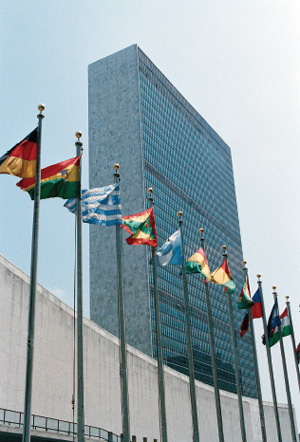 UN Headquarters UN Photo/Milton Grant
UN Headquarters UN Photo/Milton Grant
In its partnerships with the UN, Japan seeks to have its own wishes reflected in agenda-setting and rule-making in the international community, while taking the lead in its fields of strength, thereby exerting its leadership in international forums and striving to bring Japan’s foreign policy to fruition.
Prime Minister Abe and Foreign Minister Kishida both attended the 69th session of the UN General Assembly, which began in September 2014. In addition to delivering an address at the General Debate, Prime Minister Abe also gave speeches at the UN Climate Summit, the High-Level Meeting on Response to the Ebola Virus Disease Outbreak, and the Summit Meeting on UN Peacekeeping Operations. He also held the Japan–African Regional Economic Communities (RECs) Summit Roundtable and the Japan–Pacific Islands Leaders Meeting, as well as holding summit meetings with eight countries and talks with President of the 69th Session of the UN General Assembly Sam Kutesa, and UN Secretary-General Ban Ki-moon. Prime Minister Abe participated in the Washoku (Japanese cuisine) Style Reception, as well as taking part in an event on women’s issues hosted by the Clinton Foundation, lunch with women leaders actively working in US society, a meeting at the Council on Foreign Relations, and the Invest Japan Seminar. During these events, the Prime Minister actively delivered a message on the appeal and policies of Japan.
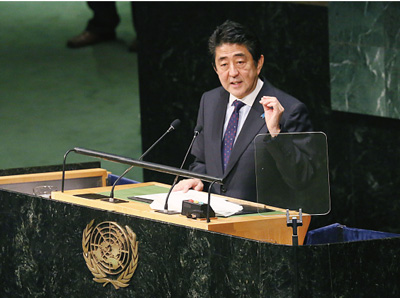 Prime Minister Abe addresses the UN General Assembly (September 25, New York; Source: Cabinet Public Relations Office)
Prime Minister Abe addresses the UN General Assembly (September 25, New York; Source: Cabinet Public Relations Office)
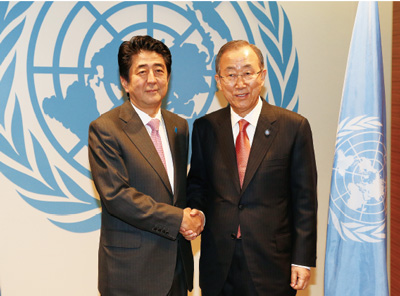 Prime Minister Abe holds talks with UN Secretary-General Ban Ki-moon (September 24, New York (Pool Photo))
Prime Minister Abe holds talks with UN Secretary-General Ban Ki-moon (September 24, New York (Pool Photo))
In his address to the UN General Assembly, Prime Minister Abe highlighted Japan’s development as a peaceful nation since the end of World War II and its contributions to the UN and the international community as a whole to date, emphasizing that, as the UN celebrates the 70th anniversary of its founding in 2015, Japan would make further international contributions, based on the policy of “Proactive Contribution to Peace” and the concept of human security, while handing down to subsequent generations its oath of renunciation of wars. Moreover, he announced an additional 40 million US dollars in support to tackle the Ebola outbreak, which was an emergent issue, as well as providing 50 million US dollars to support efforts to stabilize the Middle East and new support for the reconstruction of eastern Ukraine. Furthermore, he made a commitment to continue efforts to realize a society that places people front and center, especially endeavors to create a society in which women shine. He also promised that Japan would continue to strive to make the 21st century a world free from human rights violations against women, and to contribute to achieving peace and greater prosperity in the international community in such fields as development, disarmament and non-proliferation, North Korea, peacekeeping operations, and peacebuilding. In addition, he announced his will to engage in efforts to reform the UN in a way that reflects the realities of the 21st century and for Japan to become a permanent member of the Security Council and take on an appropriate role that the status requires. Thus, on the margins of the UN General Assembly, which is attended by leaders from across the globe, Prime Minister Abe promoted Japan’s multilateral diplomacy aimed at the resolution of global issues and enhanced our nation’s bilateral relationships via an intensive round of bilateral meetings with global leaders, proactively using this opportunity to increase awareness of Japan’s policies and viewpoints among the international community.
Foreign Minister Kishida attended 13 multilateral meetings, including the G4 Ministerial Meeting on UN Security Council Reform, the G7 Foreign Ministers’ Meeting, the Major Economies Forum on Energy and Climate, the “Friends of the Comprehensive Nuclear-Test-Ban Treaty (CTBT)” Foreign Ministers’ Meeting (as Chair), the High-Level Meeting on the Human Rights Situation in DPRK, the Ministerial Meeting on Syria, and the Ministerial Plenary of the Global Counterterrorism Forum (GCTF). In addition, as well as holding bilateral meetings with the foreign ministers of seven countries and sitting in the Japan–France Summit Meeting, he took the opportunity of his attendance at the UN General Assembly to meet the foreign ministers of around 25 countries, helping to strengthen relationships of mutual trust between Japan and those countries.
In April, President of the 68th Session of the UN General Assembly John W. Ashe visited Japan; as well as meeting Prime Minister Abe and Foreign Minister Kishida to exchange opinions regarding global issues, he gave a speech about the post-2015 development agenda. In addition, President of the 69th Session of the UN General Assembly Sam Kutesa visited Japan in July; during a meeting with Foreign Minister Kishida, they shared their views on the importance of dealing with such matters as the progress of Security Council reform, preparation of the post-2015 development agenda, climate change problems, and women’s issues, and confirmed that Japan and the UN would continue further cooperation aimed at resolving these matters.
B. The UN Security Council and its Reform
(a) The UN Security Council
The UN Security Council holds primary responsibility within the UN for maintaining international peace and security. Its activities, including peacekeeping operations based on UN Security Council resolutions, are becoming more and more diverse and its role is expanding year by year, encompassing such matters as efforts to address new threats, including the proliferation of weapons of mass destruction and terrorism.
Japan has served ten terms as a non-permanent member of the UN Security Council in the past, and is running for the 2015 election for the non-permanent seat for the 2016–17 term, with the aim to continue taking initiatives decision-making within the Security Council.
(b) UN Security Council reform
The composition of the UN Security Council basically remains unchanged since the founding of the UN, 70 years ago, and there is a shared recognition among the international community that it should be reformed without delay, in order to improve its representativeness and effectiveness.
Japan is outreaching to other countries for cooperation aiming at an early reform through an increase in the number of both permanent and non-permanent seats on the Security Council, as well as seeking Japan’s admission as a permanent member.
(c) Recent activities regarding UN Security Council reform
The Intergovernmental Negotiations within the UN General Assembly have been underway since 2009. Between December 2013 and the beginning of May 2014, seven sessions of the Intergovernmental Negotiations were held, focused on specific key issues, with a view to starting text-based negotiations.
In order to achieve concrete outcomes in 2015, which marks the 70th anniversary of the founding of the UN, Japan strengthened its efforts as a member of the G4 (India, Germany, Brazil, and Japan) in 2014. In February, a G4 director-general-level meeting was held in New Delhi (India), at which members discussed the future direction of efforts, and a public seminar was held in conjunction with the meeting. In July, Japan hosted an outreach meeting and public seminar with the attendance of countries that plays a proactive role in discussions on Security Council reform; a director-general-level meeting of G4 officials was held in conjunction with this. Taking the opportunity of the 69th session of the UN General Assembly in September, a G4 Ministerial Meeting was held in New York (attended by Foreign Minister Kishida as Japan’s representative). Participants affirmed the importance of launching text-based negotiations and outreaching to UN member countries including African countries in order to achieve concrete progress in Security Council reform. In addition, they discussed ways of expanding support from other countries.
Japan is actively promoting dialogue with other countries and regions, including those in Africa and the Caribbean Community (CARICOM), with a view to achieving reform of the UN Security Council. Japan’s efforts to garner support among the countries of Africa included Prime Minister Abe’s visit to Côte d’Ivoire, Mozambique, and Ethiopia in January, State Minister for Foreign Affairs Norio Mitsuya’s attendance at the African Union (AU) Summit, and Foreign Minister Kishida’s attendance at the TICAD V Ministerial Meeting in May, 2014. In addition, some of Africa’s Permanent Representatives to the UN were invited to visit Japan in December. In the case of CARICOM, Japan sought to garner support at the Japan–Trinidad and Tobago Summit Meeting held during Prime Minister Abe’s visit to Trinidad and Tobago in July, as well as during the Japan–CARICOM Ministerial-Level Conference held in Tokyo in November. At the Conference, participants agreed to strengthen coordination with a view to achieving convergence in their positions, in order to realize UN Security Council reform.
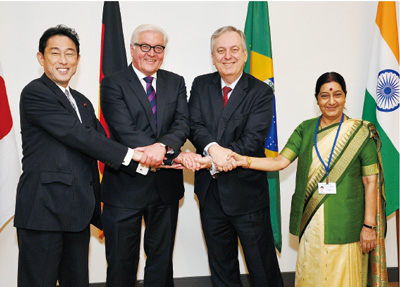 Foreign Minister Kishida (far left) attends the Ministerial Meeting of the G4 Countries (Japan, Brazil, Germany, India) on UN Security Council Reform (September 25, New York)
Foreign Minister Kishida (far left) attends the Ministerial Meeting of the G4 Countries (Japan, Brazil, Germany, India) on UN Security Council Reform (September 25, New York)
 Security Council Chamber UN Photo/Loey Felipe
Security Council Chamber UN Photo/Loey Felipe
C. UN Administration and Finance
(a) UN budget
The UN budget is composed of the Regular Budget; the biennial budget for the period from January to December the second year, and the Peacekeeping Operations (PKO) Budget; the one-year budget for the period from July to the following June.
The Regular Budget for the biennium 2014–2015 amounting to approximately 5.53 billion US dollars was approved, followed by negotiations in December 2013. The approved budget is approximately 0.6% down from the amount of 5.57 billion US dollars, the final budget level for the biennium 2012–2013. As of July 2014, the budgets for Peacekeeping Operations, amounting to about 7.06 billion US dollars over one year starting from July 2014 to June 2015, were adopted, down 11.2% from the final appropriation for the previous fiscal year.
(b) Japan’s contribution
The UN budget, which supports the UN’s activities, consists of assessed obligatory contributions by Member States and voluntary contributions that they pay on their own policy. In 2014, Japan contributed 270 million US dollars approximately to the Regular Budget and 1.3 billion US dollars approximately to the PKO Budget both as its obligatory contribution. The amount of assessed contributions is calculated by multiplying the total budget for each fiscal year of the organization by the rate of assessments decided by Member states. Japan is the second largest financial contributor after the US. As a major financial contributor, Japan is calling for better budgeting in the UN to make more efficient and effective use of its resources.
UN Secretary-General Ban Ki-moon has made UN administrative and financial reform one of his priorities and Japan supports his initiative. It is expected that such reforms will increase efficiency of the UN’s financial, budgetary, and human resource management. However, it is anticipated that it will take some time to achieve concrete outcomes of the measures introduced. While continuing to bridge differences in their respective views of Member states, Japan is actively contributing the discussion with other Member States and the UN, to ensure that actual administrative and fiscal reforms on the UN can make a progress.
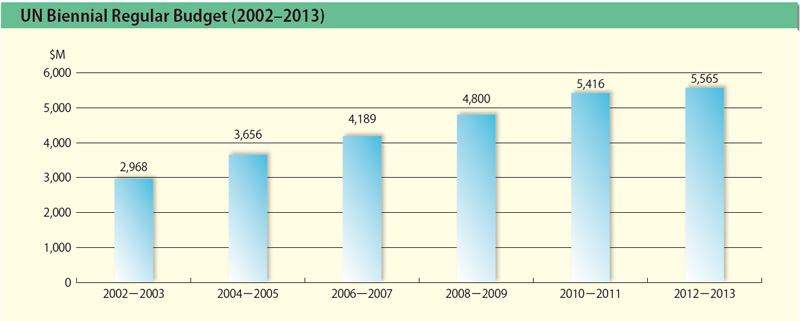
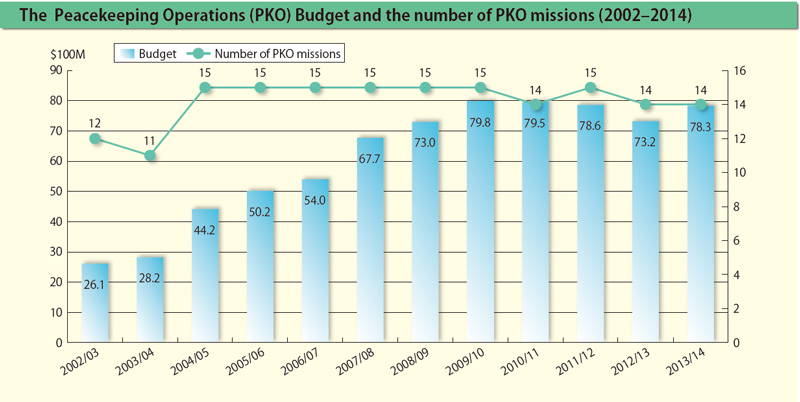
“It’s no longer the post-war period.” That is how the 1956 Economic White Paper described the spirit of the time, a year in which Japan was boldly heading towards economic growth after its successful recovery from the Second World War. In December of that year, Japan became a member of the UN, rejoining both in name and in reality to the international society. Furthermore, in the following year’s election, Japan managed to win a non-permanent membership of the Security Council (effective from 1958), which fairly represents the great expectations that the international community had towards the newly-born Japan.
However, despite the immense change that the world had gone through after 70 years from the founding of the UN, the Security Council is still trailing the “post-war” period. The Security Council, which holds principal responsibility for “maintaining international peace and security,” is led by same old five victors of the Second World War as permanent members with veto right (the US, the UK, France, Russia and China), despite the fact that UN membership grew almost fourfold from the initial 51 member states. In addition, the seats for non-permanent members, having a two-year term with no immediate re-election, grew merely once, 50 years ago, from 6 to 10 members. The Security Council in the 21st century cannot become a truly legitimate organization without permanent and stable participation in the deliberations, by the former defeated countries in the War such as Japan and Germany, former colonies-turned-emerging countries with dynamic economies such as India and Brazil, as well as African countries that have great growth potential.
The new Security Council will continue to play a vitally important role in maintaining “international (namely, among nation states) peace and security.” It is also expected for the Security Council to make efforts to rescue victims of civil wars, terrorism and violent extremism across all regions of the world, and to take steps to promote future-oriented aspiration of co-existence and tolerance between people with diverse backgrounds in the globalized international society. In other words, this is to “advance human peace and security”.
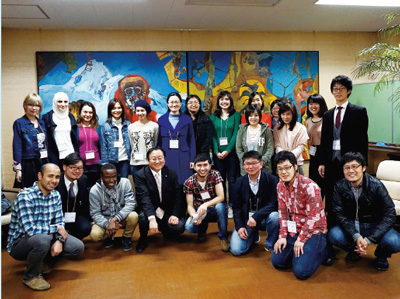 The author (fourth from left in the front row) with laboratory students
The author (fourth from left in the front row) with laboratory students
Quick and effective decision-making, while respecting the diversity of the Security Council members, is not an easy task. This explains why reform of the Security Council has been delayed. However, Security Council reform is indispensable for the contemporary world. If we can move on from abstract debates, and start text-based negotiations based on concrete documents, we can definitely make progress.
Can we evolve the 1945 UN Charter regime to a new “2015 system,” without another world war? Time is ripe for all countries to exert their strong political will to end the Security Council’s post-war period.
Toshiya Hoshino,
Vice-president of Osaka University

